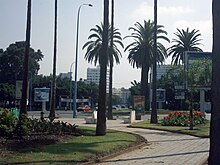Casablanca group
The Casablanca Group was a group of “progressive” African states that met in Casablanca , Morocco from January 3 to 7, 1961 , consisting of Algeria's government-in-exile, Egypt , Ghana , Guinea , Mali and - for a short time - Morocco (Morocco's left-liberal Prime Minister Abdallah Ibrahim had invited to the conference, but had been released shortly before). The leaders of these predominantly just independent states advocated a united Africa (“Africa must unite!”) And consistent decolonization . Guinea Sékou Touréand Ghana's Kwame Nkrumah were leading figures in the group. Libya , Sudan and Ceylon had sent observers to the conference.
The conference initially supported Morocco's claims to Mauritania . (Independent since 1962) Algeria, Egypt, Ghana, Guinea, Mali and Morocco later also agreed on the formation of a common African market. In 1963 a customs union came into force, but in the same year the group dissolved into the newly founded Organization for African Unity (OAU).
The conservative counterpart of the Casablanca group was the Monrovia group , also founded in 1961 , whose representatives were insulted by the members of the Casablanca group as "lackeys of colonialism".
Place de l'Unite Africaine in Casablanca
A street name in Casablanca commemorates the conference after which the group of participating countries was named. Apart from the name there is no plaque or anything like that. In the streets leading from the Place de l'Unite Africaine, the consulates of the USA and Spain as well as the Parc de la Ligue Arabe are just a few hundred meters from the square .
Others
The more bourgeois wing of the Union Nationale des Forces Populaires , founded by Abdallah Ibrahim in 1959 and broken up in 1972, was also referred to as the Casablanca group , in contrast to the left wing of the Rabat group.
